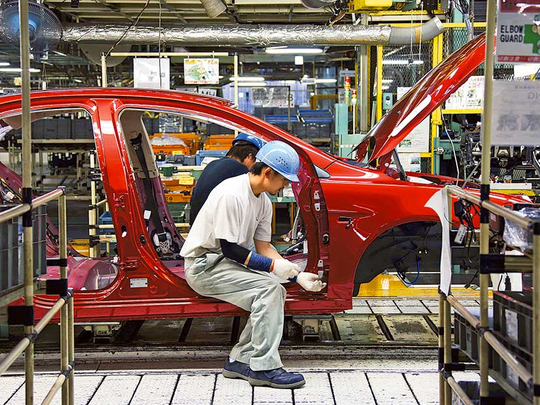
Tokyo: Mitsubishi Motors Corp’s disclosure that it manipulated fuel-economy tests risks putting the Japanese carmaker back in a familiar position: needing help from Mitsubishi group companies to stay in business.
President Tetsuro Aikawa bowed in apology Wednesday before telling reporters the fuel efficiency of 625,000 minicars had been exaggerated by as much as 10 per cent. Mitsubishi Motors sank by its daily limit to 583 yen at the close in Tokyo trading. The two-day decline wiped out about $2.5 billion of the company’s market value.
A bigger issue may still lie in store: Mitsubishi Motors has been testing passenger cars using a method not compliant with Japanese standards since 2002, according to Aikawa. While the company said it’s unclear whether the flawed method enhanced or reduced fuel economy, further revelations that ratings have been exaggerated may overwhelm the automaker, which has the lowest level of cash among its Japanese peers. The carmaker required two rounds of bailouts more than a decade ago from Mitsubishi group companies to survive a scandal involving a cover-up of deadly defects.
“Since the cover-up of recalls in the 2000s, we have tried to reinforce compliance within the company, but a compliance sense still hasn’t penetrated to every employee,” Aikawa said Wednesday. “I deeply understand how difficult it is to strengthen compliance, and I think this is a very shameful issue.”
Chief Cabinet Secretary Yoshihide Suga said manipulating test data is an “extremely serious” issue. The government has inspected Mitsubishi Motors’s plant and technical centre in central Japan’s Aichi prefecture since Wednesday and plans to disclose details of the misconduct as soon as possible, Suga told a briefing.
Mitsubishi Motors is focusing on cooperating with the investigations and isn’t yet at a stage to think about bailout plans, Kai Inada, a spokesman of the company, said by phone.
Of the affected minicars produced in the past three years, three quarters were supplied to Nissan Motor Co. In testing for their fuel efficiency, Mitsubishi Motors undervalued how much air and tire resistance the cars would encounter out on the road.
The deliberate use of biased data led to fuel efficiency being overstated for the Mitsubishi ek Wagon and ek Space, which are also sold by Nissan as the Dayz and Dayz Roox. The mishandling of the test data was intentional, Aikawa said.
The violation could result in Mitsubishi Motors having to pay back government tax rebates its minicars shouldn’t have been eligible for, said Ryugo Nakao, an executive vice president. The company is checking whether its improper conduct affects overseas models and said it’s unable to estimate the impact on its business at this point.
Mitsubishi’s shares did not trade on Thursday until the closing auction as sellers outnumbered buyers by as much as six to one. The automaker’s shares have declined about 31 per cent since alerting the public to the fuel testing issues.
Substantial impact
Mitsubishi Motors may need to consider selling non-core assets or increasing capital, Koichi Sugimoto, a Tokyo-based analyst at Mitsubishi UFJ Morgan Stanley, wrote in a report. The earnings impact is likely to be substantial as the company faces the possibility of compensating customers and Nissan, as well as lawsuits and government penalties, Sugimoto said.
The maker of Lancer cars and Outlander SUVs has been seeking to restore confidence in its vehicles after a series of scandals more than 10 years ago led the carmaker to seek multiple bailouts from Mitsubishi group companies.
Mitsubishi Motors’s financial health relies heavily on companies in the Mitsubishi group. It received bailouts in 2004 and 2005 as revenue slumped following the company’s admission it covered up defects for decades.
Though independent, the companies are among the hundreds of Mitsubishi-named businesses that trace their roots to a shipping firm founded by Yataro Iwasaki in 1870, making them the oldest business collective in Japan. Mitsubishi Heavy Industries Ltd and Mitsubishi Corp, the two main companies of the Mitsubishi group, own a combined 22.7 per cent stake in Mitsubishi Motors, according to data compiled by Bloomberg.
Rebuilding reputation
“It’s not the first time for Mitsubishi to have this kind of issues and this definitely won’t help them rebuild their reputation,” said Seiji Sugiura, an analyst at Tokai Tokyo Research Center.
Mitsubishi Motors reported having 484.7 billion yen in cash and equivalents as of the end of December, the least among Japan’s major automakers and about one-tenth the cash pile on Toyota Motor Corp’s balance sheet. Mitsubishi Motors has a market value of about $5.2 billion.
The company’s meagre financial resources leave it stretched thin for research and development. Mitsubishi Motors forecast spending 82 billion yen for the fiscal year ended in March. By contrast, Toyota would have had to spend about 88 billion yen on average per month to meet its annual projection.
It’s unclear whether the falsification of data will compromise Mitsubishi Motors’s minibar alliance with Nissan, which discovered the discrepancy. Nissan voluntarily suspended sales of the Dayz and Dayz Roox models Wednesday until Mitsubishi Motors provided further clarification, said Jonathan Adashek, a Nissan spokesman.
VW scandal
The episode deals another blow to an industry already dealing with reputation damage. Volkswagen AG admitted last year to rigging diesel models with software to meet US emissions standards. Hyundai Motor Co. and Kia Motors Corp agreed to pay fines and forfeit emissions credits in late 2014 to settle US claims they overstated mileage ratings. Ford Motor Co. also lowered ratings for hybrid models in 2014 and 2013.
The scandal also draws parallels to another crisis engulfing a Japanese auto company at the centre of the industry’s largest safety recall: troubled parts supplier Takata Corp The company has admitted to manipulating airbag inflator test data, prompting a rebuke from its biggest customer Honda Motor Co.
Takata is now seeking sponsors that would replenish its capital and allow it to emerge as a new company, a person familiar with the matter said this month.











